Natural Home Remedies for Open Pores
By Dr. Raina N. Nahar +2 more

Get,

to manage your symptom
Get your,


4 Cr+ families
benefitted

OTP sent to 9988776655



You’ve successfully subscribed to receive
doctor-approved tips on
Whatsapp

Get ready to feel your best.

Hi There,
Download the PharmEasy App now!!


Register to Avail the Offer
Send OTPBy continuing, you agree with our Privacy Policy and Terms and Conditions

Hi There,
Sign up on PharmEasy now!!
Trusted by 4 crore+ families

OTP sent to 9988776655



You have unlocked 25% off on medicines




Code: NU25
By Dr. Raina N. Nahar +2 more
Table of Contents
Many of us have experienced troublesome pimples during our teenage years. In some cases, prominent or visible pores may be associated with more noticeable acne. Enlarged or open skin pores are a common cosmetic concern for many individuals. While such conditions are not life-threatening or typically linked to serious health issues, they can affect a person’s emotional wellbeing and self-image. Skin pores are the natural openings of pilosebaceous follicles, structures that include sweat and oil glands within the skin1. They can be a significant cosmetic concern especially for women. Identifying the cause is the first step towards appropriate treatment. A skin specialist or dermatologist can advise suitable treatment depending on the severity of your condition. It is important to inform your doctor of past allergies to medication.
If the appearance of open pores causes discomfort or emotional distress, seeking professional advice is recommended. Always consult a qualified healthcare provider for guidance and avoid self-medicating.

Open or enlarged pores can affect individuals of all ages, sexes, and ethnic backgrounds. Some common factors that may contribute to the appearance of open pores include:Oiliness caused due to sebum overproduction2:
This condition can be a result of factors like:
Symptoms may include the presence of large, visible, dot-like openings on the skin. According the scientific study, the open pores can be of three types, which include, visible pores (0.1–0.6 mm2), enlarged pores (0.3–0.6mm2), and blackhead embedded skin pores1.
While natural remedies may not completely resolve all visible pores, they can assist in maintaining cleaner, healthier skin and may help minimise further pore-related concerns. The following ingredients are commonly used in traditional skincare routines and may offer protective effects against external factors.
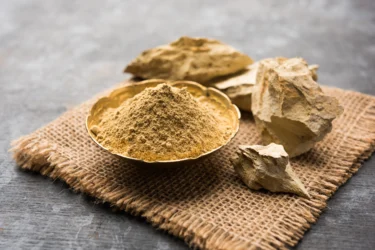
An irritated, damaged, or swollen skin can make pores appear more prominent4. Fuller’s earth (multani mitti) may have beneficial properties to help with irritated and aggravated skin. Applying Fuller’s earth may provide a cooling sensation and may help soothe the skin. It is traditionally used to support the removal of surface impurities and excess oil5. It may be particularly useful for oily and irritation-prone skin, as it may help calm and refresh the skin6.
To use Fuller’s earth for the appearance of large pores, you may prepare a face pack by mixing it with rose water to form a smooth paste. Apply it evenly to clean skin, allow it to dry, and then rinse off with water. Gently pat the skin dry with a clean towel. Alternatively, rose water can be replaced with plain yoghurt or tomato juice, based on personal preference.
Studies11 have demonstrated that oil and dirt are one of the major causes for open pores. Fuller’s earth (also known as multani mitti), is traditionally used for its absorbent properties, which may help remove excess oil and surface impurities. When used as a face pack mixed with water, it may assist in giving a fresh, vibrant, and glowing skin at an affordable cost.
Dr. Rajeev Singh, BAMS
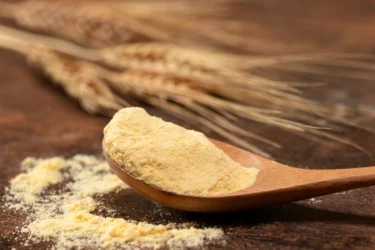
Gram flour, commonly called besan, is flour made from ground chickpeas. Gram flour has been used traditionally for its cleansing properties. Gram flour may help exfoliate and clean the skin and also help remove excess oil from the skin6.
You can make a face pack by mixing besan, yogurt, and olive oil into a smooth paste. Apply this face pack to your face and allow it to dry. Once dried, rinse it off with cool water. After removing the face pack, you can gently rub ice on your face and follow up with a water-based moisturiser to keep your skin hydrated.
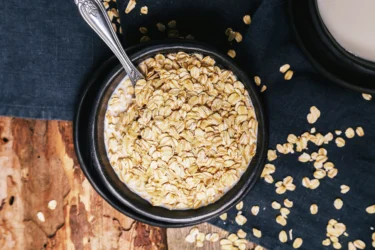
Colloidal oats provide a variety of benefits for the skin. Colloidal oatmeal can help relieve irritation and itchiness, while also offering protection to damaged skin from harmful external factors. Hydration is vital for maintaining healthy skin and its barrier function. Applying colloidal oatmeal helps retain moisture in the skin, keeping it hydrated7. All these benefits help maintain the skin’s health and protect it from being damaged. Skin pores can appear larger when the skin is irritated3.
To make an oatmeal face mask, mix colloidal oatmeal with honey to form a paste. Apply the paste evenly to your face and let it dry. Once dry, rinse off with warm water. Finish by applying a moisturiser to keep your skin hydrated.

Ice cubes can help reduce open pores. Rolling ice cubes on the skin may help tighten the skin reducing the appearance open pores on the face. Ice may also help soothe and tone skin5.
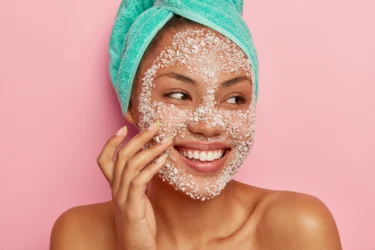
Exfoliating can help make pores less visible by removing dead skin cells and helping the skin renew itself. However, it’s important to do it gently to avoid harming your skin. If you’re unsure how to exfoliate properly, it’s recommended to talk to a dermatologist. They can suggest the best way to exfoliate based on your skin type and make sure you’re doing it safely4.
To make an exfoliating face mask, you can use colloidal oatmeal. Mix colloidal oatmeal, honey, and egg whites to form a paste. Gently apply this paste to your face and leave it on for a short time. Afterward, rinse it off with lukewarm water and gently pat your face dry with a soft towel. Alternatively, you can mix colloidal oatmeal with water to create a smooth paste and follow the same steps. This exfoliating mask helps remove dead skin cells, leaving your skin feeling refreshed and smooth

Sun damage can cause your skin to lose its firmness, leading to the appearance of more visible pores. To protect your skin from this damage, it’s important to use sunscreen with a sun protection factor (SPF) of 30 or higher. Applying sunscreen daily, regardless of the weather, helps to safeguard your skin from harmful UV rays and maintain its overall health and appearance4.
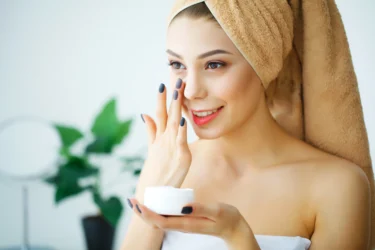
The term “non-comedogenic” refers to products that are formulated to avoid clogging pores, helping to prevent the formation of comedones (blackheads and whiteheads), which can eventually develop into pimples. When pores become clogged, they may appear larger and more noticeable. To maintain clear skin, it is recommended to choose products labelled as “oil-free,” “non-comedogenic,” or “won’t clog pores.” These formulations are designed to minimise pore congestion, supporting the overall health and appearance of your skin4.
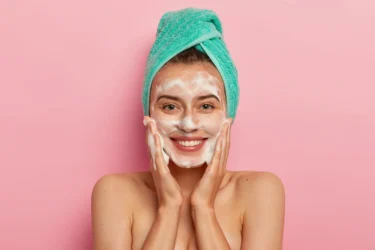
An oily complexion or clogged pores can make pores on the face appear more prominent. Cleaning your face two to three times a day can help reduce oil accumulation and clogged pores. While washing your face, keep the following tips in mind:

Excess sebum production can lead to enlarged pores. Sebum is produced by the sebaceous glands beneath the skin, and certain foods can contribute to its overproduction. By following a balanced diet and avoiding foods with a high glycaemic index, you may help reduce sebum secretion, potentially minimizing the appearance of enlarged pores8. Some examples include:
According to dermatological studies10, establishing a consistent daily face cleansing routine can be highly effective in reducing enlarged pores. It’s important to use lukewarm water, as hot water can irritate the skin and potentially worsen the appearance of pores. Gently washing your face, rather than scrubbing aggressively, helps prevent inflammation, which could cause pores to become more noticeable. Opting for a gentle, non-comedogenic cleanser ensures that your skin is cleaned without clogging pores or causing irritation. By following this routine regularly, you can help promote smoother, healthier skin with a more even complexion.
Dr. Siddharth Gupta, B.A.M.S, M.D (Ayu)
Also Read: Effective Home Remedies for Anti-Ageing
If open pores are causing persistent pimples, excessive itching, large pus-filled acne, or leaving noticeable marks, it is important to consult a skin specialist for appropriate treatment. Certain medications may have side effects, so it is crucial to speak with a doctor before taking any medication.
If the appearance of open pores causes discomfort or leads to psychological stress, seeking advice from a healthcare professional can help manage both the physical and emotional impact.
Also Read: 7 Powerful Home Remedies for Acne!
Open pores are a common cosmetic concern that can affect people of all ages and genders, though they may have a more noticeable impact on women. These enlarged pores can result from factors like excess sebum production, thick hair growth, or a loss of skin firmness.
A skin specialist can help determine the underlying cause and offer appropriate treatment. In addition to professional care, there are also home remedies that may help alleviate the appearance of open pores. For example, natural ingredients like Fuller’s earth, gram flour, and oats can be used to create face packs that may improve the skin’s health and reduce the visibility of open pores.
Also Read: Best Ways to Reduce Dark Spots On The Face
A few examples of natural remedies that can be used to reduce the appearance of open pores at home are Fuller’s earth, gram flour, and oats. You can make face packs using Fuller’s earth, gram flour, or colloidal oats to help you with open pores and hydrate the skin. These natural remedies can help you take care of your skin at home. Always ensure to talk to a dermatologist before trying anything new.
You can minimise the appearance of pores on the skin by taking care of the skin. To take care of the skin, it is recommended to wash your skin twice a day using warm water, use gentle facial cleansers, apply sunscreen daily, exfoliate the skin regularly and maintain a proper diet. In addition, you can opt for products that have terms like ”oil-free,” ”non-comedogenic,” and ”won’t clog your pore” written on them.
Yes, oily skin can make open pores appear more prominent. Excess sebum production can make the skin oily, which is one of the reasons for open pores on the skin.
Multani mitti when used as a face pack can help reduce excess oil, swelling, and soothe and calm the skin.
Yes, rolling ice cubes on the face can help reduce the appearance of open pores by tightening the skin.
Disclaimer: The information provided here is for educational/awareness purposes only and is not intended to be a substitute for medical treatment by a healthcare professional and should not be relied upon to diagnose or treat any medical condition. The reader should consult a registered medical practitioner to determine the appropriateness of the information and before consuming any medication. PharmEasy does not provide any guarantee or warranty (express or implied) regarding the accuracy, adequacy, completeness, legality, reliability or usefulness of the information; and disclaims any liability arising thereof.
Comments

Leave your comment...
You may also like
Comments